Infinite photos and videos for every Wiki article ·
Find something interesting to watch in seconds
Celebrities
Presidents
Supercars
Ancient Marvels
Crown Jewels
Largest Empires
World Banknotes
Animals
Tallest Buildings
Wars and Battles
Famous Castles
Great Artists
British Monarchs
History by Country
Orders and Medals
Best Campuses
Recovered Treasures
Largest Palaces
Rare Coins
Sports
Great Museums
Countries of the World
Kings of France
Wonders of Nature
Richest US Counties
Great Cities
more top lists



